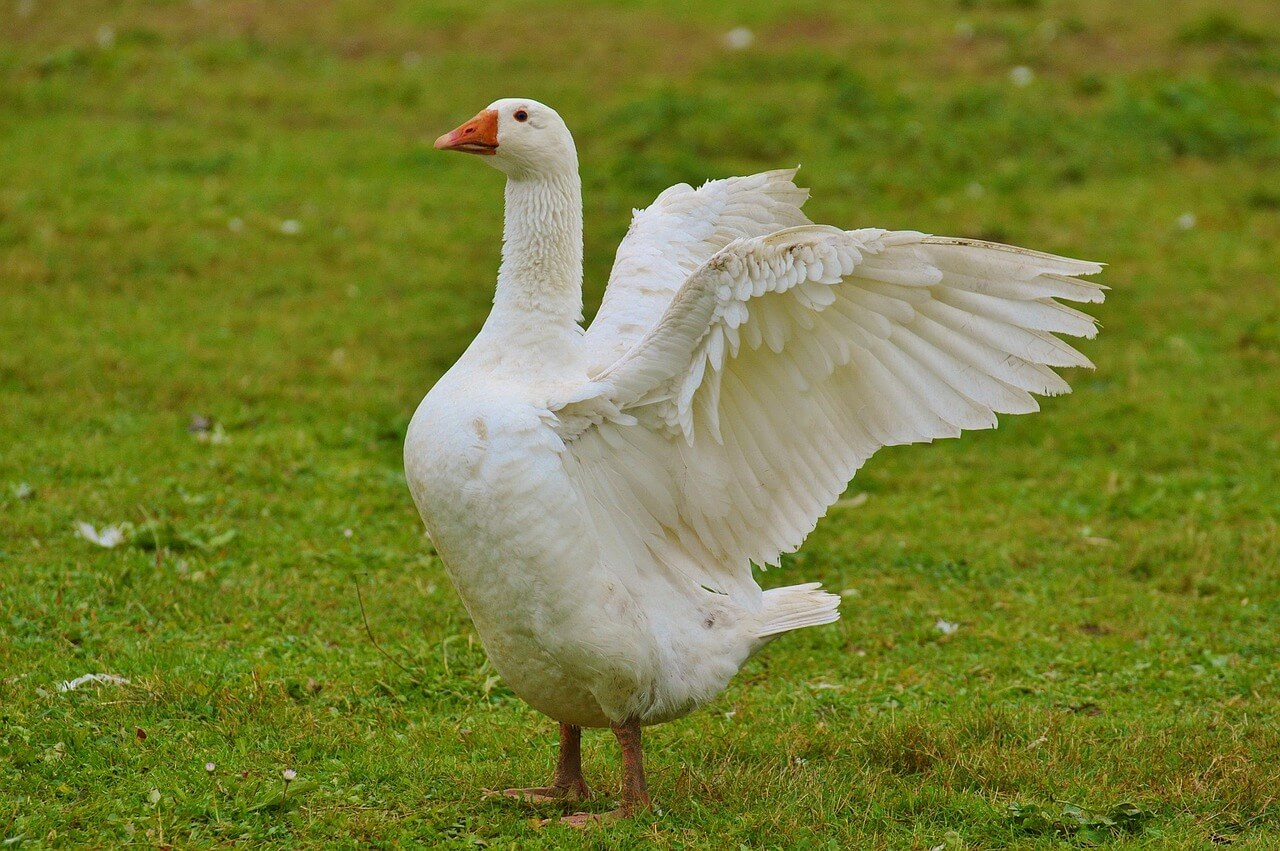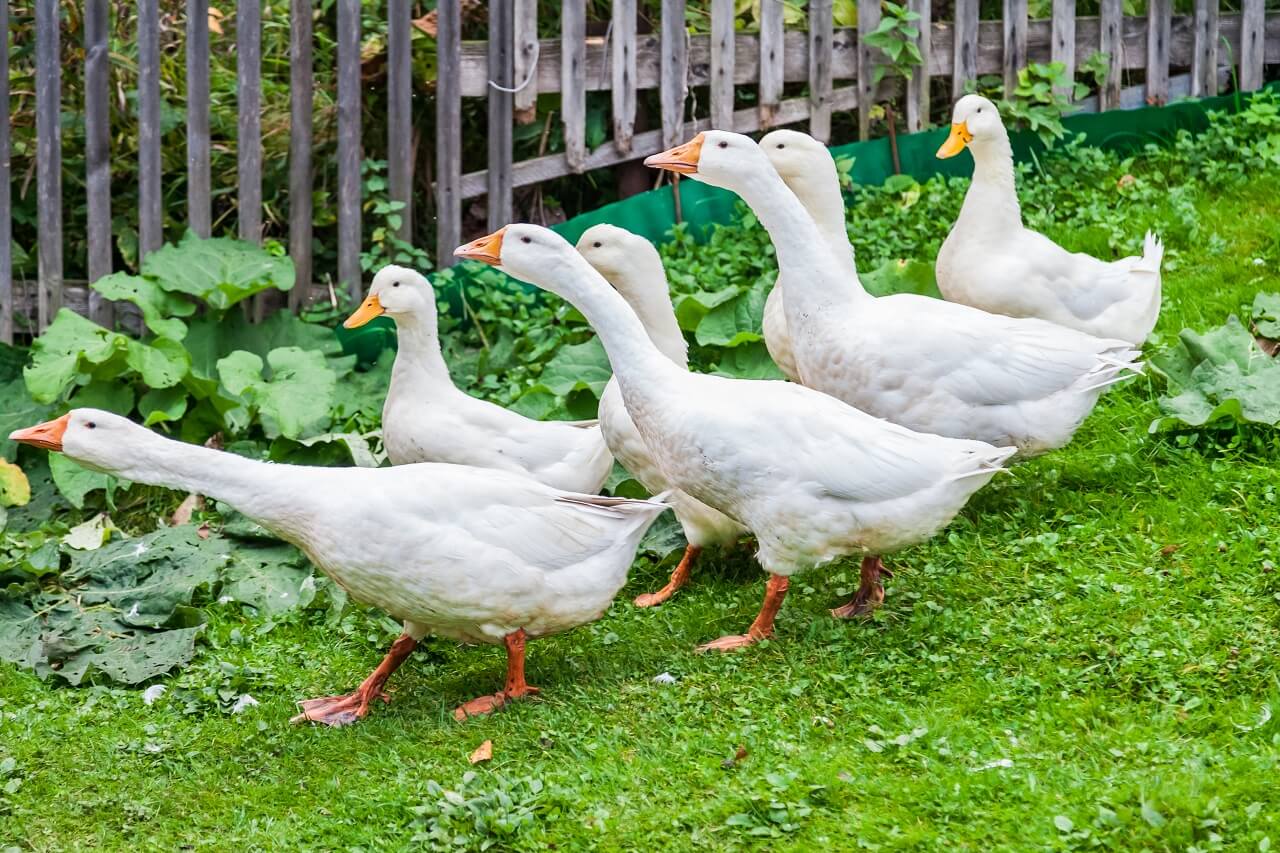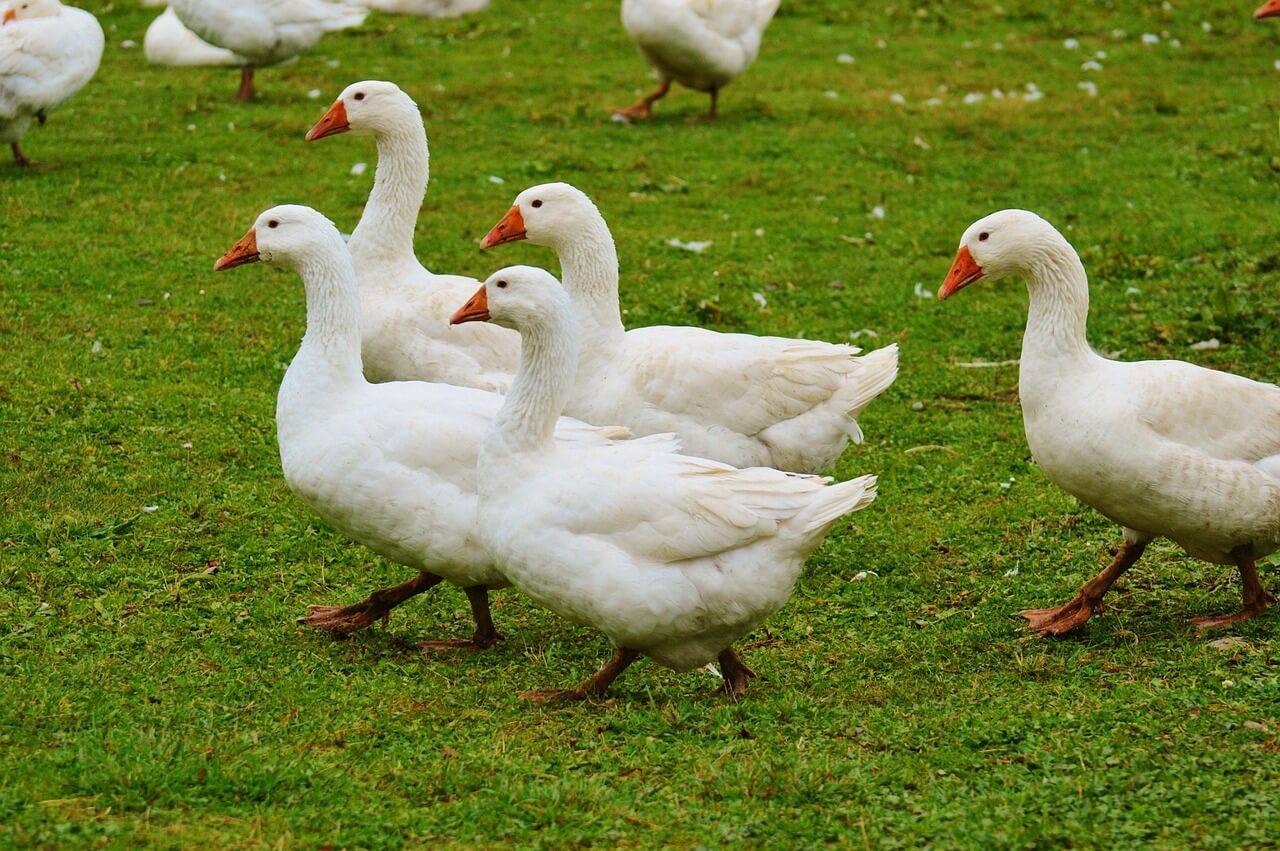There are various reasons why geese hiss. Primarily it is a defense mechanism to intimidate a perceived threat from coming any closer. Geese do this for several reasons – to protect their young, their partner, or their territory. Other motives may include telling other geese to back off, or because they want you to feed them. We will look at the reasons ‘why do geese hiss’ in more detail below.
What You'll Learn Today
What Does it Mean When a Goose Hisses?

Many domesticated breeds of geese can be very friendly once they are used to their keepers. Wild geese or ones you don’t know, however, can be aggressive.
If you keep geese, handling and interacting with them regularly, so they see you as part of the flock, helps minimize aggression. It is usually only the male birds who become very aggressive, and this is generally more prevalent during the breeding season.
The reason a goose hisses at you can have several causes.
1. Defence
Geese are very protective of their eggs, their young, their mate, and their territory.
Coming too close to a nesting female or young goslings is likely to get you in trouble, and a goose will hiss at you as a warning to stay away.
Due to the way geese protect their territory, they are utilized to protect property in a similar way. They have been doing this for centuries and are just as good as a guard dog. In fact, geese often sound the alert well ahead of any canine.
They will make a very loud honking sound if they hear or see someone approaching. Their excellent vision helps them to react quickly to movement.
2. Communication
If one goose oversteps the mark and does something to annoy another, it may result in a hissing match. Geese also honk to communicate, but a hiss is generally more aggressive.
The disagreement could be over food, goslings, or territory, and spats are usually short-lived in an established flock.
You may see geese flying overhead, making a honking noise during migration. This is done by the leaders to keep the flock together and encourage everyone to keep up.
3. Attention
If geese become used to being fed by you, they will begin to expect you to provide them with food whenever you enter their territory. It also removes their fear of other people too, making it more dangerous for others.
If you don’t provide the expected food, some geese may get demanding and hiss as a sign that they want some. Sometimes when you are feeding the flock, a single goose may hiss because it isn’t getting enough to eat.
Geese are highly intelligent and remember individual people. This means if you feed them regularly, they will always expect you to do so. Hissing at you may just be a way they ask (or demand) food from you.
4. Warning Signal
If a goose is hissing, you can be sure there’s a good reason. Hissing is most often a warning defense that means – stay away!
If you ignore the signal, then you stand a good chance of being attacked, particularly if they perceive you as a threat.
What to do When a Goose Hisses at You

If a goose is hissing at you, you really don’t want it to attack. Here are some valuable tips on how to avoid becoming a victim to a cross-goose.
- Pay attention to warning signs. Hissing, coming towards you with a lowered outstretched head, standing up tall and flapping wings while honking are all signs that the goose may attack.
- Move slowly. If a goose is agitated you need to move slowly, don’t turn around and run away, as the goose may well give chase. Just back away slowly, moving sideways, while maintaining eye contact. Never run.
- Keep calm. When we feel threatened, it’s natural to become anxious. Geese, like some other animals, can sense fear. This has the unfortunate effect of ramping up the goose’s defense response.
By staying calm, and simply moving away slowly and quietly, you should prevent the goose from escalating its offense. Never shout or flap your arms at the goose.
If you see a group of geese on the shoreline and the path requires you to go past, it is generally possible to do so safely provided there are no goslings present. Just walk slowly and calmly, maintaining eye contact with the geese.
- Eyes front. If you turn your back on the goose or close your eyes, you’re more likely to provoke it to chase or attack you. Continue looking at it while you walk away, moving sideways onto the goose.
- Don’t feed wild geese. As stated earlier, geese learn to recognize people, so if you feed wild geese regularly, they are more likely to expect you to feed them and may become agitated if you don’t.
In this video, a wildlife expert explains what you should do if a goose attacks.
Why are Wild Geese Becoming a Problem in Some Areas?
The goose population in some areas of the United States, and Canada has increased dramatically as they adapt to human habitats. Geese thrive in areas with large areas of short grass and ponds or lakes, so parks and golf courses often make an ideal and inviting home for them.
If just a few pairs of geese decide to nest in a place each year, the population in that location could increase very significantly in just a few years.
Can Geese Actually Hurt You?
Yes, geese can cause serious injury, including head trauma and broken bones. However, the likelihood of being attacked and seriously injured by a goose is extremely minimal.
The vast majority of attacks from geese result in no or very minor wounds. Often injuries sustained aren’t caused by the geese themselves, but by the person attempting to get away from them and tripping or falling.
Domesticated geese, or tame ones that are fed by people, lose their fear of humans. This results in them becoming more aggressive towards anyone who ventures too close.
A goose’s vision is excellent, and they will closely look at a person’s body language and their eyes to judge if they may pose a potential threat. This is why you maintain eye contact with a goose showing aggressive behavior, moving slowly and carefully away.
If a goose flies towards your face, move your head away from it at a 90° angle while continuing to face it.
Geese are not mean birds; they just react out of instinct like any other animal. Although it is improbable you will sustain a severe injury from a goose, it is still best to avoid wild ones during the breeding season.
Do Geese Hurt When They Bite?

Goose bites are painful and can leave you with bruising and sometimes even break the skin. It’s important to shield your eyes and face from a goose if it comes at you, but generally, it isn’t a goose’s beak you really need to worry about.
Getting hit by a flapping wing can do a lot more harm than a beak, potentially causing head injuries and even broken bones, as they are very powerful.
Psychological trauma is also likely, as after you have been attacked by a goose, you may, understandably, become very fearful of them.
Conclusion
It is better to avoid a goose attack by steering clear of them in the wild. Geese will defend their eggs, young, mates, and flock members, aggressively if necessary.
When a goose hisses at you, the best idea is to walk away sideways to it, while still maintaining eye contact.
If your own geese threaten you, think about why this is occurring. Then, try to avoid the cause in the future.
With domestic geese, you don’t need to keep a gander at all if you just want to have your geese lay eggs, or if you’re going to buy in young geese and raise them up for meat. You only need a male if you want to breed more geese.
Geese are not afraid of people, and by being aggressive towards them, you’re even more likely to provoke an attack.
There is no reason to be afraid of geese, just be cautious around them and use common sense to steer clear when possible.
If you’d like to learn more about geese, visit our site for more fascinating articles.
Thank you for writing this article! I fed wild canadian geese this morning (Mazuri maintenance) at a pond and one of them looked at me (after everyone had swam away) and hissed for like a second like he was asking for food. I was standing still the whole time so I don’t think I provoked it, and it seems like the geese recognize me because when they see me, they swim towards me. I am conflicted between feeding the geese because though I enjoy it, I don’t want them to attack a neighbor…
How do I keep the neighbors goose out of my yard? It attacks my two little dogs every time they are in my yard. She comes after me too. What can I do?